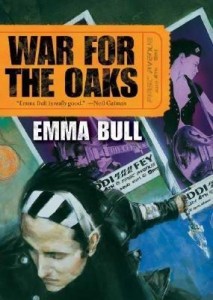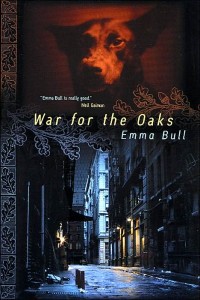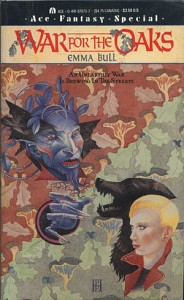

 “When Faerie and my world intersect, does anything good ever come of it?”
“When Faerie and my world intersect, does anything good ever come of it?”
Three ways to tell that it just isn’t your day:
1. You messily break up with your boyfriend, a complete jerk whose idea of managing the band you and he both play in is to send you to flirt with club managers.
2. You tell the boyfriend where he can shove said band, and quit, taking your guitar and best friend, and splitting, thus causing the (merciful) dissolution of “InKline Plain, the most misspelled band in Minneapolis.”
3. On the way home, you’re waylaid by the creatures of Faerie, in the form of a shapechanging, smooth-talking Phouka, and a water elemental called a Glaistaig. They don’t want much of you, really … just your body and presence as the Seelie Court goes to war against the Unseelie Court, all to decide which band of mythological creatures gets to influence Minneapolis. Oh, and since the Unseelie Court will probably try to kill you, the Phouka will protect you. In dog form and in human form, he’ll live in your apartment, shadow your every step, and drive you near insane with his roundabout comments. And he can’t even make coffee.
What? This hasn’t ever happened to you? Then obviously you’re not Eddi McCandry, protagonist of Emma Bull’s classic urban fantasy novel, War For The Oaks. But before you start patting yourself on the back, glad to be out of a tight spot, read on.
All of the above does happen to our hapless heroine, and that’s only the first few chapters. Before the story is through, and the last song sung, Eddi will experience the wildest summer of her life, fall in and out and in love again, start a band that isn’t destined to be “just the world’s best bar band,” and teach the creatures of Faerie a thing or two about messing with humans. Is it giving anything away to say that the band Eddi forms is ultimately named “Eddi and the Fey” or that the Phouka you hate the most can turn out to be the best friend you never expected to have?
Don’t think that things are as straightforward as they seem. After all, this is Faerie we’re talking about. About the only thing separating the Seelie and Unseelie Courts is a question of methodology, and respect for others. The line is a thin one at best. The Fey, after all, are capricious, whimsical, mysterious, and operate on a level completely alien to us. That’s one of the prices they pay for immortality.
When the Fey go to war, then, what’s to give the matter any weight? If everyone’s immortal, what makes this battle any different from children jousting with wooden swords? Simple. The presence of a mortal, bound to the effort, whose existence and presence convey mortality to the Fey. So long as Eddi’s on the battlefield … the Fey can bleed and die just like any human. That’s why Eddi’s drafted. To serve as the harbinger of death to the deathless, to bring mortality to the immortal, and to serve as the price the Fey must pay for their war.
But when the “person” picking her happens to be the aforementioned Phouka, a “common” Fey with some plans of his own, then Eddi’s involvement in War becomes much more than a formality.
How can I say so much, and not touch deeply upon the plot? Because this book is like that. It’s full of words. Beautiful, poetic words, that sing you a song, urge you into a dance, lull you into a sense of security, and weave a tale while you’re not looking. It’s easy to get lost in this book. Emma Bull is a musician in her own right, and she lovingly details the scenes revolving around music, songs, and the band with painstaking effort. She knows what she’s doing, and it shows. This book literally sings. Turn to any page, and I promise you, the text will be gorgeous, evocative, and occasionally as mysterious as the Phouka.
The characters are just as complex and memorable. First, naturally, we have Eddi, a strong-willed, defiant, intelligent, and quite competent woman who thinks nothing at all of standing up to the Fey, whether it’s the frustratingly roundabout Phouka, or the Queen of the Seelie Court herself. Eddi, described as a “madwoman with a crowbar” at one point, is no innocent bystander, nor is she helpless. She takes control of events, shaping them more to her liking, and Heaven help those who get in her way. Any Faerie who thinks her to be complacent because she’s a mere mortal is in for a surprise. It’s a measure of her strength of character that even the Fey respect her.
The Phouka is her bane, her protector, her nemesis, and her confidante. Possessing the ability to shapeshift between large black dog, and handsomely roguish man, he’s the personification of Faerie’s whimsical, clouded ways. Not only does he drag Eddi kicking and screaming into the world of the Fey, he protects her, educates her, and guides her. He rarely speaks his mind, leaving both Eddi and the reader to guess at his meaning, and find themselves wiser for the attempt. In the end, he gets exactly what he deserves. I won’t spoil it for you.
Willy Silver is an enigma wrapped in a mystery, a handsome stranger who shows up for band tryouts, and charms his way into the group with musical talent and charm. But he harbors a secret of his own, one that threatens to ruin the group dynamics before they’ve even gotten started. Hedge, the bass player for the group, is even stranger. He has the voice of an angel, the drumming ability of five men, and never speaks above a mumble. It’s rare to hear him speak clearly, and when he does, it’s never trivial. Carla is Eddi’s best friend, and perhaps the most down to earth of the whole lot. The only one whom Eddi can trust completely, Carla serves various purposes, including sounding board, reality check, and the occasional boot to the behind. The last member of the band, Dan Rochelle, is perhaps the least defined of any of them, but sadly, not everyone can take the limelight. He’s mostly there as a backup reality check, and to flesh out the dynamics of the band. And it must be said, it is in his nature to sort of fade into the background, especially with such a forceful personality as Eddi in the foreground.
There’s more, of course. Stuart Kline, Eddi’s ex-boyfriend. Hairy Meg, the brownie. Oberycum, consort to the Queen of the Seelie Court. A cast of thousands, most of which are trying to do in one another. And Bull manages to breathe life into them with a few words here, and a description there.
I’ll be honest with you. This is perhaps one of my favorite books of all time. It’s in my top five, out of the thousands I own. It’s the sort of book I can flip open to any page, and just start reading. The plot is just tight enough to keep its momentum, the narrative flows, and the story itself is different enough from the usual fare to catch the eye. I mean, really… Elves fighting a war to see who wins Minneapolis? Urban fantasy itself is nothing new, as any fan of Mercedes Lackey, Mark Shepherd, Esther Friesner, Tom Dietz, or Charles de Lint can tell you. The theme of Faerie fighting over mortal territory has been attempted, as in Charles de Lint’s book, Jack of Kinrowan . But folks, this is one of the classics in the field.
No review of War For The Oaks would be complete without a closer look at Emma’s other talent: writing beautiful lyrics. As any fan of the Flash Girls or Cats Laughing can tell you, her songs are simply gorgeous. Their presence in the book is subtly appropriate, and blends in seamlessly. Whether it’s the evocative “Wear My Face” which Eddi sings in the beginning, as a parting shot to her soon to be ex-boyfriend, Stuart, or the rousing anthem, “For It All” which captures the magic of Eddi and the Fey as a band, the songs are an essential part of the magic of this book. Another song, “Those Who Look Up” isn’t so named in the book, but comes at the very end, as part of a musical climax that metaphorically brings the house down, delivering a rousing conclusion.
Sadly, this song can’t be found anywhere else, unlike some of the others featured in War For The Oaks. I was informed that while it was recorded for the potential War for the Oaks movie, it was scrapped when that project fell through. But what that leaves us with is some gorgeous imagery and lyrics. Allow me the chance to quote one passage, and part of my favorite song from the book, and then I’ll move on:
“Dan played a keyboard line like a question that demanded an answer, and Willy punctuated it with a harsh chord. After two of those, Carla joined Willy with a distant growl of thunder on one of her toms. Hedge’s bass began to throb with the hungry rhythm of tuned engines and tires on pavement seams. There was the digitally sampled crash of a cymbal that went on and on, glass breaking in slow motion – And the band welled up behind it like water, into that first verse.” (p. 217)
That, my friends, is followed by “For It All,” of which I hereby quote my favorite bit.
“For it all, for it all
What you’re aching for,
Where the magic’s real,
and you’re like a fire in the sky,
when the deal calls for a sacrifice
And you know you can’t die.
For the edge the best ones live on,
For it all.” (p. 218)
Admittedly, it sounds a lot better as an actual song. Luckily, it exists in that fashion, and anyone wanting to know more can check out Cats Laughing’s Another Way To Travel . Most of the songs found in this book can be found on that particular album.
But lest you think that this rose doesn’t have its thorns, I’ll go ahead and point out what few flaws I can find. Emma Bull, as I’ve said, is a musician. She loves music. And when she writes about it, she has a tendency to lose herself in the words. This can leave the casual reader, or the musically disinclined, feeling out of the loop, and tempt them to skim over some of the scenes. And since the plot, and the very climax of the novel depend upon the musical numbers, this can be a Bad Thing. Perhaps.
That’s one flaw. I said a “few.” Unfortunately, try as I might, I personally can’t find anything else worth complaining about. This is a superb book, and my true regret is that Bull hasn’t written anything since that tops it in my opinion, and that includes her Bordertown work.
I’ll sum it up in one sentence: This book is a must-have, whether you like fantasy or not. It stands as one of the best examples of the urban fantasy genre around, equivalent to any of de Lint’s works. I’d be surprised if it didn’t obtain classic status fifty years down the road, long after the media tie-in empires have all collapsed into obscurity.
And by the way. This book comes with a soundtrack. Well, sort of. Most of the original songs featured in War For the Oaks can be found on one or more of four albums, all of which Emma Bull was part of. They are: Cats Laughing: Another Way to Travel and Cats Laughing: Bootleg ; and The Flash Girls: The Return of Pansy Smith and Violet Jones and Maurice and I . Several of these albums can be found reviewed on the Green Man Review site. Also, a few years ago, a trailer was made for a War for the Oaks movie, directed by Emma’s husband and collaborator, Will Shetterly. That review may also be found on this site. Go ahead and check them out. It’s time well spent.
For those of you who may have come in late, I have pleasant news. Tor, in their infinite wisdom, finally acquired the rights to War For The Oaks , which had been out of print for years, and has re-released the book in an absolutely gorgeous trade paperback edition. The cover is a striking, haunting, dark urban street, plucked right from the pages of the book, with the half-defined image of a great black dog (everyone’s favorite Phouka) lurking above the title. The fact that it looks as though Neil Gaiman’s quote, “Emma Bull is really good” is coming from the dog’s mouth is merely a subliminal message. Neil Gaiman is not a Phouka. Really.
To further sweeten the pot, this edition has a few extras added in. An introduction by the author gives us some insight into the mind and workings of Emma Bull, and how she still feels about the book that may have defined her career more than any other. A smartly-added appendix details a few steps of the long, strange road taken by Emma and her husband, Will Shetterly, as they’ve attempted to make War For The Oaks into a movie, complete with three scenes excerpted from the script, detailing things which originally took place “offscreen” in the actual book. It’s like seeing some of the outtakes from the book, making this, in effect, the DVD special edition version of the original book, in my opinion. So not only has Tor managed to return one of the best urban fantasies to the bookstore shelves, they’ve managed to improve on it, something I never really thought possible. Sleeker, darker, more dangerous, hopefully it’s here to stay for good.
In the interests of adding, improving, and making better, I hereby present a short history of War For The Oaks , written by me some weeks back in preparation for the novel’s return. Just like the 2001 edition is the Special DVD Edition, consider this an offering of the 2001 Special Edition of the WfTO review:
In 1987, Emma Bull revolutionized the way we look at the world around us with her debut novel, War for the Oaks , a no-holds-barred, fast-paced, magically written rock-and-roll fable about Eddi McCandry, a Minneapolis singer/musician who gets dragged into a supernatural war taking place out of mortal sight.
On one level, it was a story about the creatures of myth and legend, the Seelie and Unseelie Courts of the Faerie Folk, and their modern-day struggles against one another for control of mortal territory, a conflict most of us would never even imagine. On another level, it was a coming of age tale for Eddi, who learns to take her destiny in her own hands, seize the day, and grow into her potential as a musician in her own right, no longer defined by abusive boyfriends or second-rate bar bands. With such memorable characters as Willy Silver, the Phouka, the rival Queens of the Fae, and Eddi herself, War for the Oaks has become a modern classic (if such a term can be used) in the fantasy field.
Published originally by Ace, it was part of a small-scale renaissance taking place in the fantasy genre, with Emma Bull taking her place with Pamela Dean, Steven Brust, Ellen Kushner, Patricia Wrede, and, of course, Charles de Lint. Collectively and individually, they helped to flesh out and strengthen the “magical realism” or “urban fantasy” subset of fantasy that persists to this day in the works of Charles de Lint, Mercedes Lackey, Laurell K. Hamilton, and Jim Butcher, as well as many others. Thanks in no small measure to Terri Windling, the then-editor at Ace responsible for finding some of these authors, and publishing most of them, War for the Oaks seemed to herald a fundamental shift in style. While the great sweeping epic fantasies set in magical kingdoms are as popular as ever, it can’t be denied that the concept of magic in our own backyards is just as popular, and the idea of the Fae living amongst us is no harder to believe than Elvis sightings at the Kwik-E-Mart. So find yourself a copy, and get ready to rock and roll like never before.
